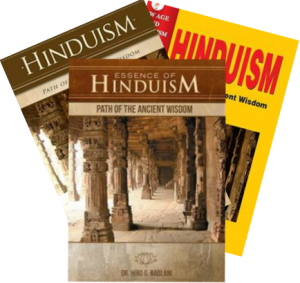Spiritual Gems from Hindu Masters
- Irsha or ill will at seeing other person’s achievement is regarded as sin.
- When one achieves something, he/she may regard it as ‘Blessings’ of God, parents, or Guru. Thus one may exempt oneself from any ego or arrogance.
- When one removes the garbage from a temple premises, it symbolically is like removing the ego and arrogance from within.
- The most important task is the task of ‘service’; serving without any show and without any arrogance, with all humility and smile on the face.
- It is very important to ‘patch up’ and reconcile with those in the family who have become torn away, especially when any auspicious occasion comes around.
- For ‘learning’ and ‘improving’ in life, it is recommended to search for the company of wise and mature persons, and to shun the company of immature and evil persons.
- If we shall surrender to God sincerely and completely, no harm will come to us.
- ‘Gyan’- spiritual knowledge, by itself, is rather dry. If it is used only for arguments, trying to win over others, it may become a burden and non-productive. When the ‘Gyan’ is made along with tender ‘Bhakti’-devotion, it becomes the greatest bliss and useful.
- Where is God? Is there a place where God is not there? Wandering all places in search of God is not necessary. There may be more spiritual vibrations in some of the worship places and pilgrimage, but basically we need to develop ‘Faith’ in God to feel His presence anywhere.
- Those who constantly slander about others usually do not tell the truth; we may not trust them.
- For peace in the world, first create peace at home, and surroundings. Each individual is responsible in some way, in contributing toward the world peace at large. Observing the spiritual virtues will help immensely in creating the environment of peace.
- A very clean drop of water may get dirty easily when it comes on contact with dirt; a person may thus be easily influenced by a bad company.
- Our Rishis have attributed many unbelievable things as God’s.
- When we sincerely think and pray to God, we are in turn internally guided toward divinity in all our actions.
- When a person has spiritual knowledge Gyan and humility, he becomes a great person.
- In Hindu theology, there is a ritual kanya puja, when a small girl is worshipped as goddess In this way, the feminine status is elevated.
- Kath-Kirtan is the factory, where saint is formed. We may never stop listening Kath-Kirtan, however big we grow.
- Apart from the five prerequisites of Hindu theology, we may also perform all rituals etc. with complete ‘Faith’ in God. Those who perform actions with ‘Faith’ are the true devotees. We are as near God, as we have the ‘Faith’.
- Hanuman, even though most powerful, capable of destroying the whole Lanka single-handed, is always depicted sitting humbly, at the feet of the Lord. In Hindu theology, all sincere devotees become most modest before God.
- God is most impressed with ‘love’ and sincere ‘devotion’ of His devotees. Scriptures even mention that He dances with tears in eyes at the sight of such devotees.
- When the ‘poison gland’ of cobra is removed, his bite becomes harmless. So too when all the evil vices of kama, krodha, lobha, moha, ahimkar-arrogance, and matsara-envy are removed, our action turn good and cause no harm.
- The basic nature of water is to be ‘calm’; but when it comes in contact with heat of sun or fire, it becomes hot and agitated, so too humans may turn agitated when we come in contact with ‘desires and temptations’.
- True devotee does not worship God for any material thing, but only out of true love for God.
- ‘Kirtan’ is regarded as a very powerful tool; not only those who listen it with sincere attention, but it spreads the spiritual vibrations far and wide, lasting its effect long after it is over!
- Seeing God in all may be the first step toward not hurting others in any way. We may do all that is necessary for our own defense, but always with feelings of love, and not hatred.
- Domestic Arguments are the most destabilizing. Always consider home a sanctuary for the entire family. Home should have a higher place of politeness than the office or any other place. We can choose other ways to throw off stress: walk through a park or along a beach, visit a yoga center or stop to pray at a temple on our way home.
- Everyone knows that one day he/she will die, but the thought of death often causes some type of mental resistance. But if one mentally relinquishes the idea of death as compulsorily imposed, and instead surrenders to God voluntarily in satsang, worship, kirtan etc., it becomes a wisdom choice.
- Of all the virtues, the virtue of sheer-humility is regarded the highest. Even Lord, as Rama, ate and relished the berries, tongue-tasted by Shabri; and as Krishna, He washed the feet of his poor friend Sudhama.
- In Hindu theology, ‘respect’ to parents, elders, Guru, and God is regarded as most important. With respectful attitude, we may learn and imbibe all the virtues; it also becomes a tradition parampara; we too will become elderly, and it will be a great benefit when ‘respect’ comes back to us in time.
- When a ‘sanyasin’ is initiated, he is instructed that now he wears ‘God’s Dress’; he may not speak or perform any action, which will be disgrace to this ‘Divine Dress’
- According to Hindu philosophy, we must go through our karmaphal; the consequences of our past actions through eons of birth cycles-that Our prayers may be not to remove such consequences of our past actions karma, but rather we may remember and utter the name of God at all times. This will help greatly in relieving the pains and sorrow of our sufferings-much of the karmaphal consequences may in fact be totally or to great extent be actually mitigated by remembering and praying sincerely.
- There are number of incidents when most pious persons, when they die, their body remains fresh, even emitting sweet smell for days together (eg. Paramhansa Yogananda).
- Even though God is the most Supreme, in Hindu scriptures God is also depicted in various subordinate positions, as ‘infant’, ‘child’, ‘younger brother’, ‘lover’, even as ‘servant’, cutting across all formalities, keeping uppermost the ‘Love’ and ‘Affection’ most tenderly! This concept indirectly also emphasizes the ‘Respect’ and ‘Love’ for all relationships, small or big in our own life-to see God in all!
- Hindu scriptures are often based on previous scriptures, eg. Srimad Bhagvatam is regarded as summary of the Vedas and many other scriptures. But for complete information, one may go through those scriptures also.
- If one gets the habit of going to satsang regularly, gradually the person will be transformed toward spirituality.
- If one walks on the path of virtue and divinity, and especially if one think and wish well for all, one will soon reach God.
- Lower animals perform all their actions as per their instinct according to their previous karmas. But humans may perform with higher consciousness of divinity and thus gradually cut across all the bonds of previous karmas.
- In Hindu culture, there are many ‘sanskars’- traditions created, right from birth till death. These ‘sanskars’ instill spirituality and divinity in the being; ignoring and neglecting these ‘sanskars’, may deprive the person of the highest of the virtues and spiritual teachings.
- Small 4-year old children often can remember and recite long prayers in English. If the mother would teach them to recite Gayatri and other Vedic hymns, they can easily learn that too. They can thus be trained to become more virtuous and spiritual in life.
- If a good act is performed with pride and arrogance, it may become a sin! When we perform a good act, we may not even mention it to others.
- As long as we cannot care for ‘cow’, we may not be able to advance on the path of spirituality. ‘Cow’ is the symbol of divine in Hindu culture.
- Every day we may listen to some Kirtan or Satsang; ‘simran’-remembering God regularly, one may not go to many pilgrimage places. We can easily do ‘simran’, sitting at home, and benefit greatly.
- A true devotee is always ‘humble’. Shabri used to sweep the floor on which the Sadhus used to pass. In course of time, her humility and service brought to her the highest reward of Lord coming to her cottage.
- Start training the child even before the child is born. Any spiritual and religious narrations will create the good effect, when listened when still inside the womb.
- Prahlad’s mother instructed him to listen to his step mother’s instruction to pray to God so that he may be born in her womb, and be eligible to sit in the lap of his father. His prayers and meditations worked wonders.
- When we read the scripture, we may regard it not as a tale or story, but rather a direct instruction for ourselves to get the proper benefit.
- Parampara or tradition is the core of Hindu heritage; Kumbh Mela is regarded as the crown of all Parampara.
- True devotees attribute all the success in spirituality to God’s grace; they do not boast about it as their own merit.
- Practice and recite the name of God as much as possible so that it will come naturally on your lips at the time of death.
- Ajmal was originally a Rishi of great spiritualty. He came in contact with a beautiful prostitute, and became very sinful. It is therefore important to be vigilant at all times.
- Simran –uttering God’s name has been given utmost importance in Hindu theology. ‘More than God is God’s name.’ A true incident is told about famous Indian astronaut Rakesh Sharma. Once during his training period, his airplane caught fire, and he jumped out. For some reason, the parachute did not open. Fortunately he fell on electric wires, and then on floor, and was thus saved. When asked, he told that all the time that he was falling; he was reciting the name of God as taught by his mother in the childhood. God’s name can work wonders.
- The goodness of all one’s virtues can be lost by speaking even a single word of injury.
- Whenever we are mentally agitated and disturbed, we must turn our attention toward ‘spirituality and God’; ‘peace’ may be obtained soon.
- With ‘spirituality and God’, we may curb our undesirable animal activities, rather than submit as slaves of our lower instincts and tendencies- As humans, we are required to use our discretion and free will and gradually reach higher levels of ‘divine consciousness.’
- After Ravana was killed, Lord Rama instructed that his body may be cremated with full proper Brahminic rituals as he was a very learned and accomplished. In Hindu scriptures, it is stated that all vices and shortcomings of a person may be discounted after the death.




